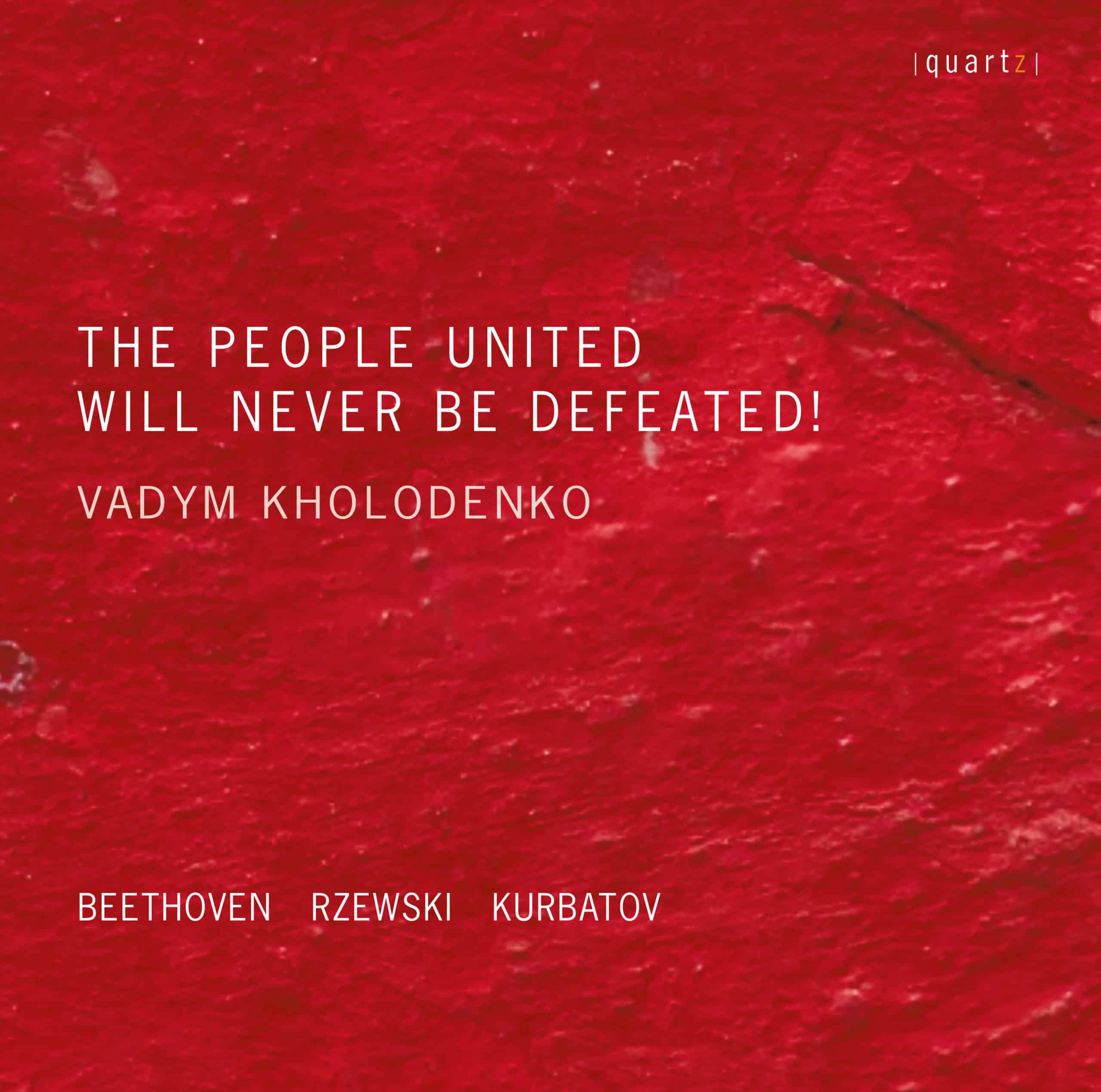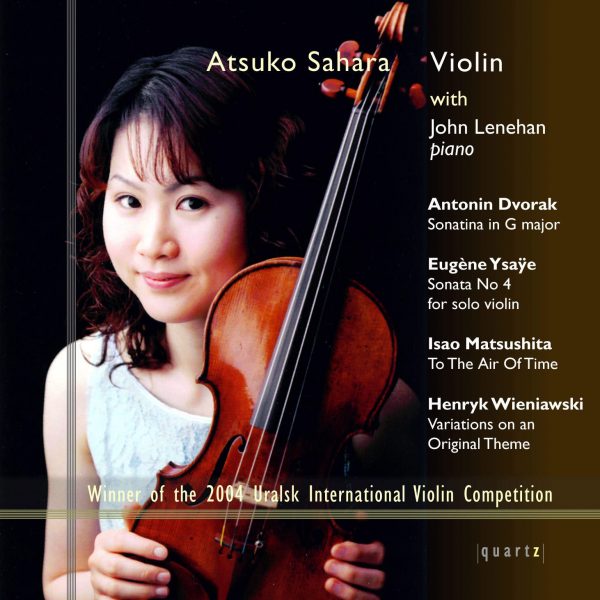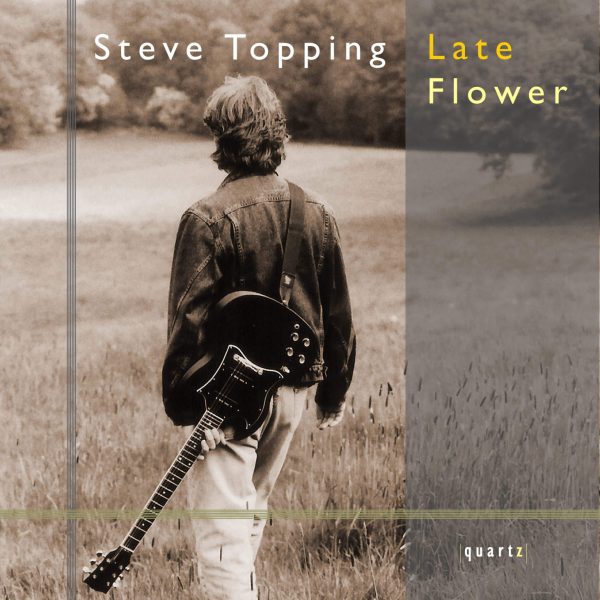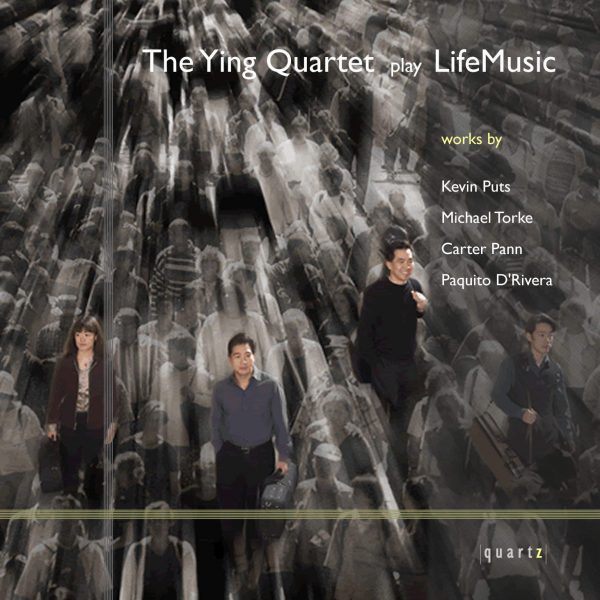The People United Will Never Be Defeated
Price range: £7.99 through £16.99
Recordings usually start to live their own lives after their release. However, this one happened to be very special since it acquired its very meaning long before getting to the publishing phase. Recorded in September 2021, this project survived February 24, 2022 – the date marking for me the end of a fragile balance between humanity and medieval darkness. This recording is dedicated to the people of a free and independent Ukraine, whose unshakable spirit will never be defeated.
About This Recording
The Twelve Variations on a Russian Dance (1796, WoO71) were Beethoven’s first treatment of a Russian theme. The piece was dedicated to Anna Margaretha, Countess von Browne, the daughter of a Russian senator and the wife of a retired Russian officer, Count Ivan Yurievich Browne. Beethoven dedicated several more works to Countess von Browne and her husband, who arrived from Russia to live in Vienna when Beethoven was 25, including the three Op.10 piano sonatas.
The theme of the variations is the well-known Russian tune “Kamarinskaya”. Beethoven took this melody from the “Russian Dance” in the Moravian-Austrian composer Paul Wranitzky’s ballet Das Waldmädchen. Wranitzky himself said he had borrowed the theme from a violin concerto written by a violinist from Italy, Ivan Mane Jarnovic (aka Giornovichi). Nonetheless, the form of the theme used by Wranitzky and Beethoven is different from the way it appears in Jarnovic’s work. Not so much a Russian dance tune as a classical styled reflection of it, where the three-bar ostinati of the boisterous original, with a strong emphasis on the tonic, are transformed into a somewhat hesitant, lilting five-bar metre, with a neat little classical curtsey at the end of each phrase. Interestingly, the same version of the tune is found in Joseph Haydn’s miniature for mechanical clock; perhaps, since all three composers knew each other in Vienna in the ’90s, Haydn and Wranitzky might have used a third source unknown to us.
This relatively early composition, written at the age of 26, bears all the hallmarks of Beethoven’s youthful style. The rich textures, stylistic variety, sturdy polyphony and adventurous rhythmic ideas put it in the first rank of his early masterpieces. As usual in the variation form, major-key variations give way to minor, of which there are three, evenly spaced: the third, seventh and eleventh variations. The final bright transition from minor to major happens very aptly at the start of the closing variation, which, following the classical tradition, develops into an extended fantasy adorned with excursions into distant keys.
The American composer Frederic Anthony Rzewski composed his 36 variations The People United Will Never Be Defeated! on the song “¡El pueblo unido jamás será vencido!” in 1975. This song had been written five years earlier by the Chilean activist Sergio Ortega as an anthem for the Popular Unity coalition – hence the words of the refrain, giving the song its title. After the overthrow and death of Salvador Allende, and throughout the dictatorship of General Augusto Pinochet, the song became effectively the signature tune of opposition to his regime, and spread far beyond Chile as the anthem of the left- wing movement across the whole of Latin America and further, from Portugal to Iran.
As a forthright Leftist, this was Rzewski’s statement of opposition to dictatorial regimes. To emphasise the point he included two pungent quotations: the Italian revolutionary song “The Red Flag” (Bandiera Rossa, variation 13) – which the composer described as “to honour the Italian people, who in the ’70s opened their doors to so many refugees from Chilean fascism” – and Hanns Eisler’s “Solidarity Song” (Solidaritätslied), written in 1932 (variation 26) – “a reminder that present threats existed in the past, and that it is important to learn from them.” Rzewski also explains the extravagant scale of the cycle as part of his programme: “The extended length of the composition may be an allusion to the idea that the unification of people is a long story, and that nothing worth winning is acquired without effort”.
Nonetheless, the composer was clearly inspired not simply by ideology but also by the technical challenge of his chosen theme and of the elaboration of the cycle as a whole. The song is made up of two bass themes that stem originally from the European baroque, but which by the second half of the 20th century had firmly entered popular culture.
The song is built out of two simple bass themes that stem originally from the European baroque and which by the second half of the 20th century had become firmly part of popular culture. The piece’s eclecticism, chiming with its theme of “unification”, springs from this: twelve-tone technique runs up against swing, elaborate polymodality against a cheeky imitation of a rock-keyboard player. And the purely instrumental aspect of the composition is equally eclectic: in these variations Rzewski, himself a piano virtuoso, writes a catalogue of various piano techniques, including such “extended techniques” as the performer being asked to whistle echoes in imitation of harmonics, or to use the pedal to create harmonic overtones.
Rzewski’s Variations have been compared to Bach’s Goldberg Variations; like Bach, Rzewski extends his theme beyond the classical model of two eight-bar phrases, and it is essentially monophonic. The grain of the theme is a regular two-part song with verse and refrain, but the composer includes both a chanted version of the refrain (as a kind of epigraph to the cycle, played in unison
octaves), repeated verses plus the refrain, and a transition from one to the other: thus the 36-bar theme is longer than the variations, each of which is 24 bars long.
Another echo of Bach comes in the number-play: Bach’s 32-bar theme is reflected in 32 pieces (30 variations, plus the opening and closing statements of the aria); Rzewski’s 36-bar theme is answered by 36 variations, after which the theme is repeated almost in its original form, with a dynamic coda.
Bach’s 30 Variations are grouped in threes, each group consisting of a movement in dance rhythm, a fleet-fingered toccata and a canon; Rzewski’s 36 Variations fall into six sets of six, the first five of each set exploring a variety of textures, and the sixth a patchwork made up of textural images from each of the preceding five.
Two of the six sets have a special form: the penultimate set (variations 24–29) is a written-out cadenza, completely changing the structure. The final set (31–36), which restores the 24-bar structure of each variation, is a summary of the whole cycle, becoming ever more concentrated as the end approaches: the variations from 31–35 are a summation of all the textural ideas of the previous 30, while the final 36th variation is a laconic resumé of all that has gone before, each variation’s material compressed into a short motif. Rzewski accomplishes his task of unification through ever-increasing intensity. The ultimate compression of material toward the end causes an explosive ‘Big Bang’ – a free improvisation by the player, where the composer merely indicates the desired length of the improvisation as five minutes.
The paradoxes in Rzewski’s musical thinking strike you forcefully on first hearing. The sound-picture itself is full of incongruities: sparkling avant-garde embers, followed by a cooling draught of kitsch, and the way these elements interact is itself paradoxical: the thumping contrast between the in-your-face populist theme and avant-garde rigour, mitigates both the kitsch and the rigour, restoring the theme to its original baroque stateliness.
The Last Three Minutes, by the Russian composer Alexei Kurbatov (born 1983), is a subtle exploration of several stylistic motifs. The one which seems most obvious at first sight – ‘post-aesthetics’ in the spirit of Valentin Silvestrov – is actually the most superficial. The fusion of the various styles is cleverly accomplished. The ostinato rhythm of the ‘clock’ counting down The Last Three Minutes makes you think of the codas of Tchaikovsky and Shostakovich; at the same time, the shining nostalgic melancholy of triple-time motifs from Glazunov’s Raymonda and Debussy’s Clair de lune is darkened by a gloomy major-minor shadow à la Schnittke, with his characteristic overlay of major and minor thirds; then again, the gradual petering out of the ostinato and the disintegration of the fabric of motifs recalls not so much Schnittke’s macabre Guignol as the melancholy coda of Ravel’s Adélaïde.
Elena Dvoskina Translation: Robert Thicknesse
Track Listing
- Thema, Allegretto
- Variation 1
- Variation 2
- Variation 3
- Variation 4
- Variation 5
- Variation 6
- Variation 7
- Variation 8
- Variation 9
- Variation 10
- Variation 11
- Variation 12, Allegro
- The People United Will Never Be Defeated! - Thema. With determination
- The People United Will Never Be Defeated! - Var. 1 - Weaving : delicate but firm
- The People United Will Never Be Defeated! - Var. 2 - With firmness
- The People United Will Never Be Defeated! - Var. 3 - Slightly slower, with expressive nuances
- The People United Will Never Be Defeated! - Var. 4 - Marcato
- The People United Will Never Be Defeated! - Var. 5 - Dreamlike, frozen
- The People United Will Never Be Defeated! - Var. 6 - Same tempo as beginning
- The People United Will Never Be Defeated! - Var. 7 - Tempo (Lightly, impatiently)
- The People United Will Never Be Defeated! - Var. 8 - With agility; not too much pedal; crisp
- The People United Will Never Be Defeated! - Var. 9 - Evenly
- The People United Will Never Be Defeated! - Var. 10 - Comodo, recklessly
- The People United Will Never Be Defeated! - Var. 11 - Tempo I. Like fragments of an absent melody - in strict time
- The People United Will Never Be Defeated! - Var. 12
- The People United Will Never Be Defeated! - Var. 13
- The People United Will Never Be Defeated! - Var. 14 - A but faster, optimistically
- The People United Will Never Be Defeated! - Var. 15 - Flexible, like an improvisation
- The People United Will Never Be Defeated! - Var. 16 - Same tempo as preceding, with fluctuations; much pedal
- The People United Will Never Be Defeated! - Var. 17
- The People United Will Never Be Defeated! - Var. 18
- The People United Will Never Be Defeated! - Var. 19 - With energy
- The People United Will Never Be Defeated! - Var. 20 - Crisp, precise
- The People United Will Never Be Defeated! - Var. 21 - Relentless, uncompromising
- The People United Will Never Be Defeated! - Var. 22
- The People United Will Never Be Defeated! - Var. 23 - As fast as possible, with some rubato
- The People United Will Never Be Defeated! - Var. 24
- The People United Will Never Be Defeated! - Var. 25 - With fluctuations
- The People United Will Never Be Defeated! - Var. 26 - In a militant manner
- The People United Will Never Be Defeated! - Var. 27 - Tenderly, and with a hopeful expression
- The People United Will Never Be Defeated! - Var. 28
- The People United Will Never Be Defeated! - Var. 29
- The People United Will Never Be Defeated! - Var. 30
- The People United Will Never Be Defeated! - Var. 31
- The People United Will Never Be Defeated! - Var. 32
- The People United Will Never Be Defeated! - Var. 33
- The People United Will Never Be Defeated! - Var. 34
- The People United Will Never Be Defeated! - Var. 35
- The People United Will Never Be Defeated! - Var. 36
- The People United Will Never Be Defeated! - Thema, Tempo I
- Three last minutes
LUDWIG VAN BEETHOVEN (1770 – 1827)
12 VARIATIONS IN A MAJOR ON THE RUSSIAN DANCE FROM THE BALLET DAS WALDMÄDCHEN BY P. WRANITZKY WoO71
FREDERIC RZEWSKI (1938 – 2021)
THE PEOPLE UNITED WILL NEVER BE DEFEATED! (1975)
36 VARIATIONS ON “¡EL PUEBLO UNIDO JAMAS SERA VENCIDO!” BY SERGIO ORTEGA
ALEXEY KURBATOV (b. 1983)




